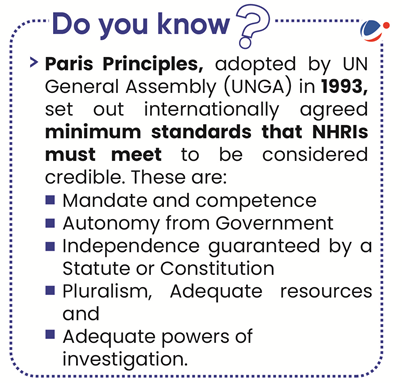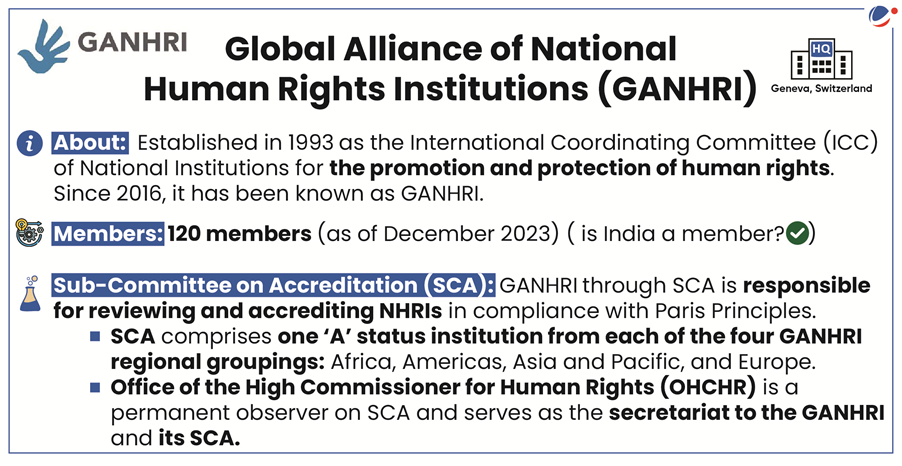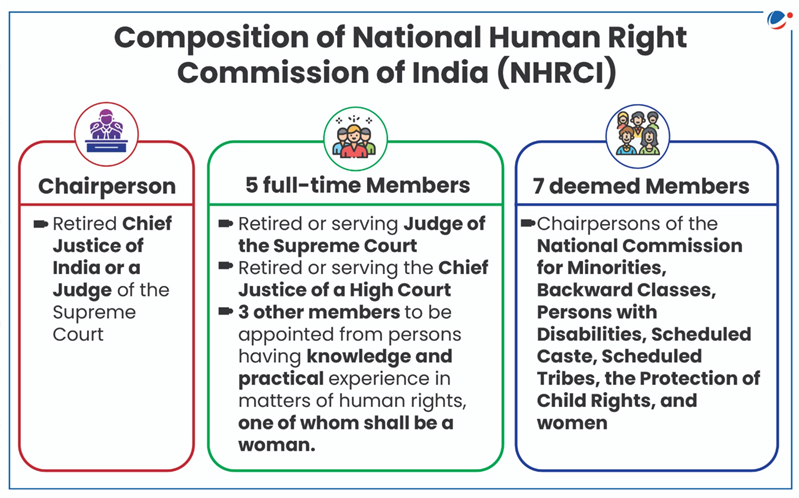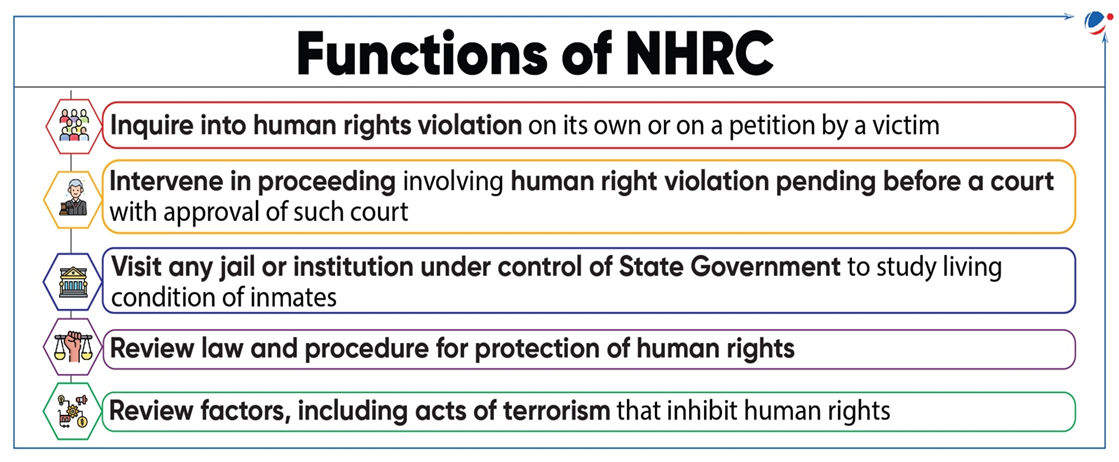Why in the news?
Recently, the United Nations-linked Global Alliance of National Human Rights Institutions (GANHRI) deferred the accreditation of the NHRCI (National Human Rights Commission of India) for the second year in a row.

Background
- In a unique peer-review-based accreditation process, GANHRI ensures compliance of individual National Human Rights Institutions (NHRI) with internationally recognised standards also known as the Paris Principles.
- This accreditation aims to ensure the independence, pluralism and accountability of NHRIs.
- Process of NHRIs Accreditation: NHRIs are reviewed by the Sub-Committee on Accreditation (SCA) of GNHRI when it applies for initial accreditation, and re-accreditation every five years. NHRIs are accredited by GANHRI as
- 'A status': Accredited to fully compliant NHRIs: They have independent participation rights at the UN Human Rights Council, its subsidiary bodies and some General Assembly bodies and mechanisms. They are eligible for full membership of GANHRI, including the right to vote and hold governance positions.
- 'B status': Accredited to partially compliant NHRI. They participate in GANHRI meetings but are unable to vote or hold governance positions.

Accreditation of NHRC
- NHRCI got 'A' status of accreditation first time in 1999. In 2016, NHRCI's accreditation was deferred by a year after which it received an 'A' rating in 2017 by SCA of GANHRI.
- In 2023, accreditation of NHRCI was deferred. The current accreditation by GANHRI is differed due to a lack of diversity in staff and leadership and insufficient action to protect marginalised groups.
About the National Human Rights Commission (NHRC)
- Headquarters: New Delhi
- Genesis: It is a statutory body, established under the Protection of Human Rights Act (PHRA), 1993 as ameded in 2006 and in 2019.
- PHRA defines Human Rights as the rights relating to life, liberty, equality and dignity of the individual. These rights are guaranteed by the Constitution or embodied in International Covenants and are enforceable by courts in India.

- Appointment: Chairperson and Members of the Commission are appointed by the President of India, on the recommendations of a committee, headed by the Prime Minister, consisting of:
- Speaker of Lok Sabha
- Minister-in-Charge of Ministry of Home Affairs
- Leader of Opposition in Lok Sabha and Rajya Sabha
- Deputy Chairman of Rajya Sabha
- Tenure: Chairperson and members of NHRC will hold office for three years or till the age of seventy years, whichever is earlier. The Chairperson and members both are eligible for reappointment.
- Removal: Both Chairperson and members can be removed from office by order of the President on the ground of proved misbehaviour or incapacity after consultation with the Supreme Court.
- Powers of NHRC: It has all the powers of a civil court trying a suit under the Code of Civil Procedure, 1908 and in particular in respect of the following matters, namely:
- Summoning and enforcing the attendance of witnesses and examining them on oath;
- Discovery and production of any document;
- Receiving evidence on affidavits;
- Requisitioning any public record or copy thereof from any court or office;
- Issuing commissions for the examination of witnesses or documents.

Issues associated with the NHRC
NHRC cannot consider complaints for human rights violations which happened more than one year before filing of complaints or issues which are subjudice. This puts limits on its power.
Moreover, the SCA of GANHRI has pointed out the following issues:
- Lack of diversity: Only 95 out of 393 staff positions are held by women in leadership positions in NHRCI.
- Government dominated selection Committee: The selection committee for appointing is dominated by the ruling party, curbing the dissent of opposition.
- Government interference: The PHR Act provides for recruiting civil servants with the rank of Secretary as Secretary General of NHRCI which may lead to government interference in violation of Paris Principles.
- Investigation resources: The NHRC rely on deputed officials for investigation. They may lack accountability due to insufficient oversight mechanisms.
- Limited Engagement with Civil Society: There is a lack of effective engagement with civil society and human rights defenders.
Way forward
- Independence: The PHR Act should be amended in a manner that allows the independent appointment of qualified persons for investigative positions in line with Paris principles.
- Investigation: There is need for an independent police complaint commission to deal exclusively with human rights issues, as in the UK and South Africa. Also, steps should be taken to develop the investigation wing of NHRC.
- Effective utilisation of statutory power: Section 17 of the PHR Act empowers NHRC to conduct its investigation if Centre/state government do not respond within the stipulated time.
- Wider collaboration: Regular and constructive engagement with all relevant stakeholders such as civil society is essential for NHRIs to effectively fulfil their mandates.
- Other reforms: The appointment process must ensure the composition of NHRC reflects India's diversity, a time limit of one year should be relaxed, etc.







